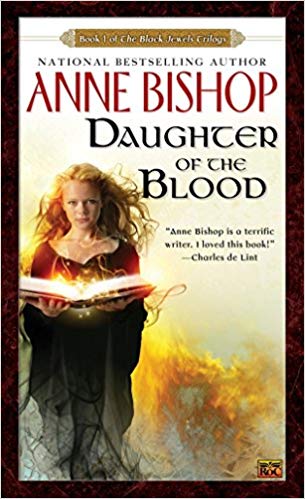|
I first read this book in high school, and couldn’t understand what people were raving about. I mean, it was an okay book, but I just couldn’t see what was so special about it that made so many people quick to call it one of the best books they’d ever read.
Now? I still wouldn’t say it’s one of the best books I’ve ever read, but I certainly do appreciate it more now than I did then. It straddles the line between dark fantasy and a fluffy read, easy on the mind without being simplistic, dark without letting itself get bogged down in grit and melancholy. It has much the same feel that a lot of mid-90s fantasy did, which made it a comfortable book for me to fall into when I felt like reading something new yet familiar.
The story mostly revolves around Daemon and Saetan, who, along with Lucivar, revolve themselves around Jaenelle, a young and abused girl who is also Witch, powerful and prophesied. Jaenelle knows nothing of her destiny, only that she sees and hears things that others believe aren’t real, and that the truest friends she has are those who live in other realms. Daemon has his sights set on being her lover, when she’s older. Saetan views her more as a daughter. Lucivar… Well, we don’t really get to see much of Lucivar. He shows up in only a few scenes, we know he’ll play some part in all this, but it isn’t so much mysteriously hinted at as not really dealt with.
Added to all of this is the fact that the politics of the landed are corrupt and brutal. The society being a matriarchal one is not unheard of in fantasy, but the level of abuse that the females in power believe they can inflict upon males is nothing short of abuse in itself. I’ve heard a good many people insist that this portrayal of society is unrealistic and smacks of “girl power gone insane.” In some ways, they may not be wrong. What is worth keeping in mind though is that what Bishop did here is nothing but a gender reversal. If you saw the same situation with males in power and abusing females as their sex slaves, their trophies, it wouldn’t be remarked upon as being unrealistic at all. Bishop did a good job of pointing out gender inequality by doing nothing more than flipping it upside down, less a subtle undercurrent and more of a blatant, “Take that.”
I did have my problems with this book, though, and the setting in which it takes place. First off, many of the Blood characters seem to be inconsistent in their emotions, one moment being cunning and calculating, aloof and powerful, the next throwing hissy fits because somebody won’t do what they say. This did little but make me feel uncomfortable and disgusted, and to little end given that the political and social situation running through the entire novel did that in a far more profound way.
I’m also not a big fan of the ‘dark’ names used throughout the novel. Saetan, Daemon, Lucivar, Hekatah… All allusions to dark figures from various real-world mythologies, and they gave off the feel of “dark for the sake of dark.” That sort of thing never impresses me, and often leaves me with the feeling that the author couldn’t have a character’s dark side stand on its own but that the audience would need a constant reminder.
Ditto when it comes to the sexual aspects of this book. It seemed like the characters took every opportunity to make sexual references, not in the form of bawdy jokes or leers and stares, but in more casual mentions. It wasn’t enough to say that a woman had been broken, or broken by a Warlord. No, we have to have it pointed out that she was “broken on a warlord’s spear.” It seemed needless, and once again seemed like it was trying to be edgy without having a need to be edgy. Really, when a main plot point in the novel is the sexual abuse of young girls, readers aren’t going to be shocked by casual euphemisms.
But in all honesty, when most of the things I have a problem with in a novel are small nitpicky things that don’t actually affect the storytelling or the plot itself, I can consider the book to be a pretty good one. I’m glad that I took the time to revisit Daughter of the Blood instead of letting my decade-old impressions continue, as now I’m quite interested in pursuing the rest of the series. The world that Bishop weaves is complex and many-layered, the characters interesting and not without considerable flaws and foibles. It is, in short, what many fantasy novels strive for and fall short of in their development. It’s by no means perfect, but it is still good, and that’s quite enough for me.
|
